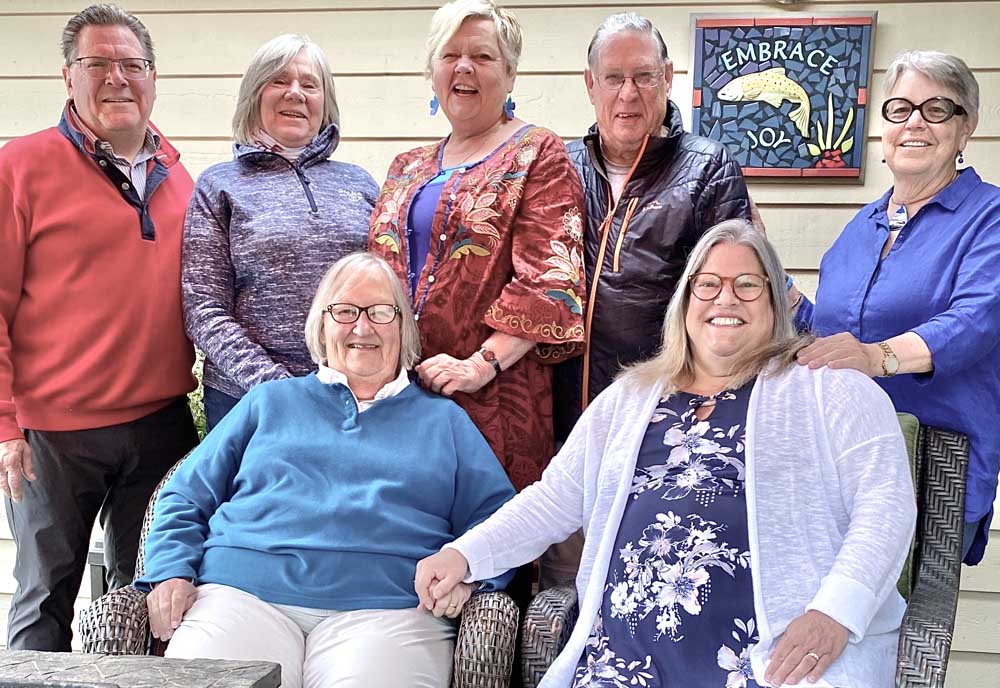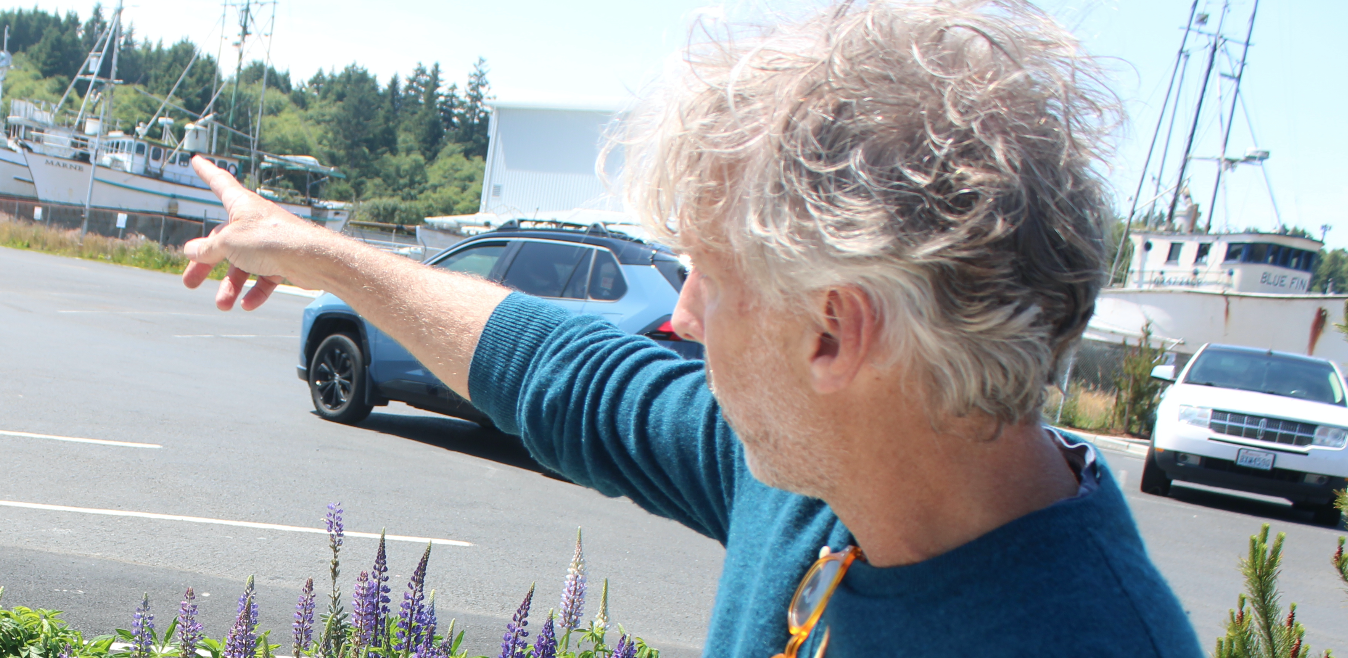Coast Chronicles: Pandemic remembrances
Published 7:28 am Friday, March 14, 2025

- The Pod on June 6, 2021 (standing from left): Steve Kovach, Bette Lu Krause, Nanci Main, Al Betters, Cate Gable. (Seated): Rosemary Hallin, Teri Kovach.
In the beginning
Humans got a slap upside the head in the first quarter of 2020 from a deadly virus created, some say, at the Chinese Wuhan Institute of Virology, or, some say, at the Huanan market in Wuhan, Hubei province, a source of live animals for food. It’s still controversial: was it a lab leak mistake, or of zoonotic origin? (If you’re interested in the nitty gritty detail take a look at a National Library of Medicine analysis here: tinyurl.com/ypr2jdf4.) It’s still unclear.
We didn’t even know what to call it at first. At the end of November 2019, the first case of pneumonia caused by a new CoV appeared and was labeled by China 2019-nCoV. On Feb. 11, 2020, it was renamed SARS-CoV-2 because of its similarity to the severe acute respiratory syndrome. The final name we landed on was covid-19.
Well, whatever the name or its source, those of us following the news were first blasé, then concerned, then totally freaked out.
I wanna be home
In late February, I was in Tucson and had just called long-time friends Phil and Nancy Allen to talk story. We’d all been following the virus news and were trying to make sense of it. No one really knew what was going to happen — it sounded like interstate travel could be banned or curtailed, and I certainly didn’t want to be stuck in the desert far from family and friends. I remember Phil saying to me, “Get a foam pad for the back of your Volvo wagon and come home!”
Yep, I thought, that’s the ticket. I hoofed it over to a foam shop in the 4th Avenue district of Tucson and, by that afternoon, I was headed north. Despite the worry of whatever this virus-thing would bring, my road trip was quiet and lovely. I was ensconced in my little Volvo bubble with Jackson and, as always, I was loving the panoramic scenery flashing by my windshield. I had decided to head to sister Starla’s in Yakima. (When the world’s in crisis, or maybe even coming to an end — who knew? — you want to be with family.)
I stayed a night at Pahranagat National Wildlife Refuge, one of my favorite wayside camping spots, cuddled up with Jackson in the back of the car. We arrived after midnight, and the next morning I watched the lakeside light change from dawnish pinks to sunlit skies.
I don’t remember the exact date I crossed over to Washington state, but I was pretty happy about it. Because I’d been traveling with stops for gas and food, I stayed by myself in Vancouver, Washington for the required incubation period before heading to Yakima.
Starla and I cohabited until it seemed the world wasn’t coming to an end, though we were all wearing masks by that time and washing all our groceries! So I finally decided to head back to Nahcotta.
Pandemic declared
On the Saturday afternoon of Feb. 29, 2020, reporters joined local and state health officials, packing into a room for a news conference in downtown Seattle. Details were shared about what appeared to be the first covid-19 death in the nation just the day before. This supposed “first” was a man in his 50s, a patient at EvergreenHealth Hospital in Kirkland. He had underlying health conditions — and no recent travel history.
The state Department of Health (DOH) later confirmed that at least four other Washingtonians had died from covid complications before or on Feb. 28, 2020. Three were included in the first known coronavirus outbreak in the U.S., in long-term care facility Life Care Center of Kirkland. Later still, DOH announced that the first person to die in the state was actually a Snohomish County woman in her 30s. Now the first recorded death in the U.S. has been attributed to Lovell “Cookie” Brown, a 78-year-old Kansas woman who died on Jan. 9, 2020. (The Seattle Times fills in some details: tinyurl.com/y4exedpy). Covid was declared a pandemic on March 11, and on March 21 all non-essential travel was closed down. (A complete timeline for the pandemic here — it’s fascinating: tinyurl.com/2p8sj6rv)
The Pod
None of us can remember exactly how we formed our pod, but it was composed of seven people, some of whom didn’t know others super well. Boy, did that change fast as we discussed our rules for gathering, began to share meals, and stocked up on basic supplies: toilet paper, masks, gloves, hand sanitizer, and canned goods. (I still have a case of black beans in my pantry.)
Somebody brought a dominoes game to one of our meals and that settled it — we became the Chickenfoot Tribe. (It’s a great game — rules here: tinyurl.com/mwkbsae7) Five years later, we’re still a pod and we’re still occasionally playing dominoes; but, yes, things have changed. One of our pod mates moved halfway across the nation. Several others of us have had medical challenges over these five years, but we’re still tight. We count on each other for comradery, rides, food, advice, gossip and general hilarity. Our pod got us through.
What has changed?
Looking back, a lot has changed around us, too. The New York Times recently published an article about what the pandemic catalyzed: remote work, less driving and plane travel, less eating out (more taking out), more women joining the workforce but fewer wearing heels. Lots of people quit their jobs and got better ones, or started their own businesses. More dogs were adopted. Some people got married sooner; some people got divorced. Alcohol purchases soared. Spending time at home became a thing. We cut our own hair.
Lots of things got weird but lots of things got better. We had to push the big pause button as a nation — and as a world — and think things through; many of us reprioritized people and events in our lives. Overall, I think the changes were good, though I still miss Marshall Shanks — our gentle giant. Marshall, 35, died Sept. 16, 2020 in Vancouver, the same day his mother Marie, 61, died in Seattle. For some reason the family did not believe in getting the vaccines.
In our pod we all got vaccinated in every round that was recommended. Some of us never even got covid. We’re lucky and, over these five years since the pandemic, we’ve forged lasting bonds. These personal connections are serving us well now as we face a new challenge — this one to our nation and our democracy.
Resilience was the name of the game during the covid years, and it’s still what is needed now. Hold onto your hats, your values, and your friends as we weather this current storm.






